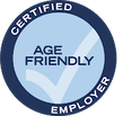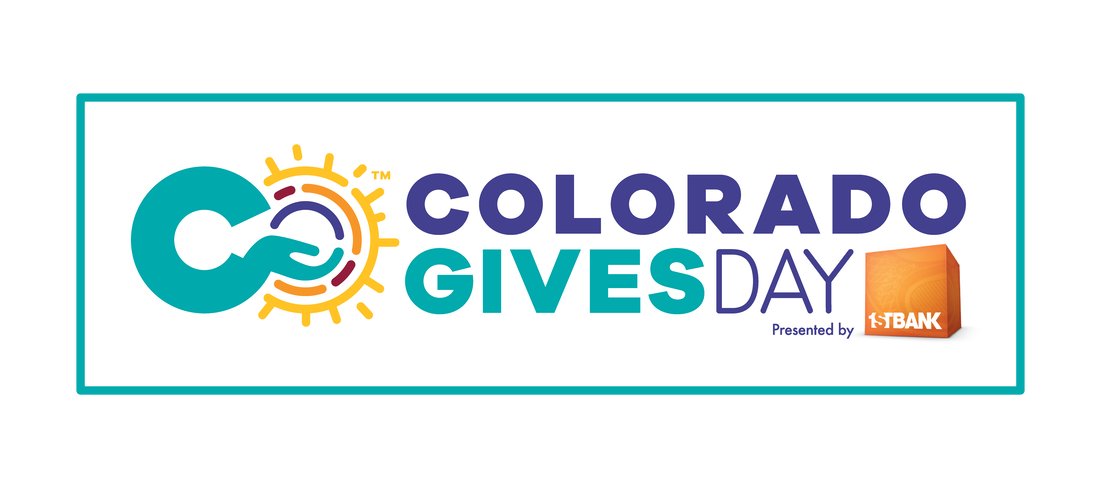 SNAP UPDATES ARE COMING IN MARCH, 2023 You may have heard about some upcoming changes to SNAP benefits. Let's take a quick look at what SNAP benefits are, what's changing, and how that may impact you. SNAP stands for Supplemental Nutrition Assistance Program (SNAP). It's part of a federal nutrition program to help low-income households purchase food. SNAP provides a monthly benefit that helps families and individuals buy the groceries they need to eat and stay healthy. The benefit is based on income, resources, and the number of individuals in the household. Since the pandemic's start in March 2020, Colorado SNAP households have been getting extra monthly benefits. These additional benefits are called "emergency allotments." Most households have been getting this on top of their regular SNAP benefits. Congress authorized these emergency allotments, but they are temporary and will end in March. February will be the last month that households will receive an emergency allotment. This change may have a significant impact on some households. Here are some common tips on how to prepare for the upcoming reduction:
Aging Resources plans to help offset these additional costs to Douglas County older residents in the following ways:
If you have further questions about any of our programs or want to receive information on food resources, give us a call and speak to one of our aging experts. AuthorConor McCarthy
1 Comment
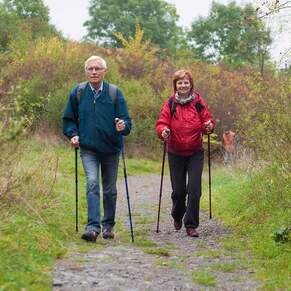 Here in Douglas County, and indeed across all of Colorado, we're so lucky to enjoy truly unparalleled natural resources. It might seem like common sense that being in nature improves our mood and reduces stress, but did you know that study after study has demonstrated that engaging with the outdoors seriously improves older adults’ physical and mental health? In one study, older adults who had spent 120 minutes in nature over the previous week were significantly more likely to report feelings of good health and well-being than those who had no nature exposure. Another found that one hour in a natural environment improved folks’ attention span and memory by 20 percent, and more time resulted in even greater gains in both memory and creativity, and that regular exposure to green and blue spaces (like parks and ponds) significantly reduced old adults’ levels of salivary cortisol — a physiological marker of stress. A third found that exposure to greenspace reduced the risk of type 2 diabetes, cardiovascular disease and premature death. Those are some serious health benefits! The same studies provide us with some good general tips on how to get the most out of the time we spend outside. They recommend trying, as much as you can, to experience nature without the pressure of a set amount of time or other preconceived goals. They suggest that you keep your phone use to a minimum and focus on attending to the feedback from each of your senses when you’re immersed in a green or blue space. These suggestions can help you to really be present in the moment, which can lessen anxiety and improve your overall mental health. In addition to these general guidelines, there are some best practices to consider when planning to spend time outside at Colorado’s high elevation. Remember to always stay hydrated and be aware that both alcohol and caffeine can exacerbate dehydration. Wear and reapply plenty of sunscreen, and most of all, take things slow! Pace yourself and be on the look out shortness of breath, nausea, or headache – these are signs that you need to rest. If these symptoms persist, you’ll want to seek medical attention. There are plenty of ways to safely enjoy the outdoors. Gardening is one great way to interact with nature and get some exercise at the same time – it’s an excellent activity for older adults to maintain strength and make light aerobic activity part of their daily lives. If you’ve already got a green thumb, consider leveling up by creating a natural area with native species that can become a route for butterfly and bird migrations. Speaking of birds, birdwatching is another fantastic way to get outside and connect with nature. Here in Douglas County, guided birdwatching walks are offered at Roxborough State Park several times per month. Finally, consider going out for a walk. The hiking opportunities here are truly endless – there’s something for everyone, no matter if it’s your first time out or you have decades of trail experience. As a starting place, consider Larkspur’s own Sandstone Ranch Open Space. With over 12 miles of trail, it’s one of the premier outdoors spaces in all the county. No matter the activity, simply being outside and enjoying nature can provide a variety of benefits for your energy, creativity, and mental and physical well-being. If you or someone you know could use some more recommendations on how to stay active and engaged with nature or needs a hand with any other part of the aging process, please do reach out to us. We’d love to hear from you – it’s what we’re here for.  Aging with Pride: Older Adults and LGBTQ Issues Happy Pride Month! In previous posts, we’ve highlighted the ways in which America’s older adult population is changing and growing. One of those changes involves diversity: older adults today are more diverse than ever before. That includes LGBTQ adults, of whom there are nearly 3 million living all across the country. This month, we want to acknowledge the strength of these members of our communities and to examine some of the unique structural challenges they have faced. While we’ll be talking in broad demographic terms, it’s important to remember that there’s an individual story behind every number - each older LGBTQ adult carries their own story of pride, silence, struggle, hope, and love. In many respects, LGBTQ elders show remarkable resilience given that many of their experiences as young people occurred in a context wherein being LGBTQ was less accepted, or worse, actively criminalized. They may have experienced family rejection, employment discrimination, violence, and more. And yet, surveys have demonstrated that this cohort often reports greater feelings of happiness, in comparison to those aged 50 and under. Nevertheless, LGBTQ older adults face some specific challenges. The lack of social and legal acceptance, both historically and currently, of LGBTQ people has had a profound impact on LGBTQ older adults. Among the keys to successful aging are good health and competent healthcare; economic stability and security; and strong social and family support. Unfortunately, these are the exact areas where LGBTQ elders report disparities when compared with their non-LGBTQ peers. Economically, discrimination and lack of equality under the law has historically led to lower earning power for many LGBTQ adults. Among respondents to a National Health, Aging, and Sexuality/Gender Study, 27% of respondents reported not being hired, 26% not being promoted, and 18% being fired for their sexual orientation or gender identity. Moreover, while marriage equality has now been enshrined in the law, its long-time absence meant that older same-sex couples were denied many of the financial and family protections afforded different-sex couples. In the healthcare space, LGBTQ adults, in general, report poorer physical health outcomes as well as higher rates of psychological distress. They face additional difficulties navigating programs across the healthcare landscape, from insurance and Medicaid (same-sex couples could not jointly apply for the latter until recently) to long term care. Moreover, 40% of LGBTQ respondents to a survey in their 60s and 70s reported that their healthcare provider didn’t know about their sexual orientation. Finally, many LGBTQ older adults grew up in a time and place in which family rejection was rampant, and they sadly could not consider the proposition of raising children with a partner of the same gender. As a result, they tend to have built strong networks of friends and chosen family, but sometimes do not have the familial networks of support that many non-LGBTQ folks rely on as they age. While these networks are strong, a lack of legal family ties can be challenging as friend networks don’t have the legal recognition to take time away from work, share health insurance plans, or make medical decisions for one another. This lack of legal recognition, reliance on chosen family, and the absence of funding for LGBTQ-specific aging resources mean that LGBTQ elders are susceptible to isolation. Studies show that LGBTQ older adults are much more likely to live alone than their non-LGBTQ counterparts, and are also less likely to access necessary services than the general aging population. Experts offer some suggestions to redress these disparities. They suggest that local, state, and federal government entities should pass comprehensive employment and housing protections that prohibit discrimination on the bases of sexual orientation and gender identity. They also advocate for the recognition of relationships, so that federal and state programs that confer benefits to married couples honor the relationships of same-sex couples, specifically in instances in which a partner may have passed away before the freedom to marry became available. To respond to the increased risk of social isolation, traditional community centers for older adults should provide space and support for LGBTQ specific programming, and LGBTQ community centers should reciprocally provide space and support for elder-specific programming. Medical service providers and facilities, including long term care facilities, hospitals, and doctors’ offices should train staff on competently serving LGBTQ older adults. LGBTQ older adults have been on the forefront of the fight for equality and fairness – they are change-makers who are responsible for tremendous progress in this country. At Aging Resources, we honor the individuals who comprise this community, and we are committed to doing our part to ensure that they can age on their own terms. We believe that everyone has a right to empowerment and support as they age.  Last month, we highlighted our observation of Older Americans Month. In addition to this celebration, May was also Mental Health Awareness Month, and today we want to look at how older adults' lives are impacted by this critical issue. Mental health is becoming an increasingly important part of the public health conversation. It plays a role in how we connect with others, make decisions, handle stress, and many other aspects of daily life. And we now know that our mental health deserves as much attention as our physical health does. There are some common risk factors and indicators for mental health challenges shared by everyone. These can include Social Determinants of Health (SDOH), which are the conditions in which people live, learn, work, and play; things like financial stability, education access, access to quality health care, neighborhood and living environment, and social and community life. Studies have consistently shown that SDOH impacts our mental and physical health outcomes. Other risk factors include genetics, biology, and brain chemistry, whether someone has experienced trauma, and habits and lifestyle choices. Some mental health circumstances are unique to the experiences of older adults. Many live alone, resulting in a higher risk of social isolation and mental health concerns, and that percentage increases with age. Some stressors are just more common as we age, like reduced mobility, chronic conditions, and grief. And historically, mental health services are often underutilized by older adults. Access to mental health care can be hindered by perpetuating stigmas and misconceptions regarding ageism and mental health issues. In addition, lack of adequate insurance coverage or other physical conditions may take priority during a consultation with the doctor. What can we as a community do to address this situation? There are some encouraging trends, such as the increasing integration of mental health care into primary care visits. People are typically more inclined to discuss concerns such as depression with their general physician rather than seeking a mental health-specific doctor. Healthcare systems can also strive to meet the specific needs of older adults by providing training for health professionals in caring for older people and developing age-friendly services and settings. The State of Colorado recently gave some incentives to encourage medical students to specialize in geriatrics as our population is getting older. Together, we can work to eliminate the stigma surrounding mental health challenges by being conscious of our language choices, choosing empowerment over shame, and educating ourselves. At Aging Resources, we focus on collaborating with older adults to figure out what their individual, independent aging journey looks like. By providing services such as companionship, we decrease social isolation. Our transportation program allows for greater access to health care, including mental health. Come volunteer with us! Our services give residents more options to live life on their terms, resulting in a better quality of life for our older neighbors. If you or someone you know could use a hand navigating a mental health question or any other part of the aging process, please reach out to us at 303-814-4300 or www.agingresourcesdougco.org. Aging in American is changing - it’s an undeniable fact that our population is growing older: between now and 2050, the number of Americans over the age of 65 is expected to double and Colorado is no exception. In fact, we have the third-fastest aging population in the nation. By the end of the current decade, the state demographer projects that the percentage of adults aged 65-74 will increase by 19%, those aged 75-84 by 68%, and those 85 and older by 49%. These trends are consistent across all areas of the state, from the Western Slope to the San Luis Valley to the Front Range. Here in Douglas County, the 75-plus population is expected to grow by a whopping 446% percent by 2040 – that’s the most significant increase in the state. This burgeoning generation of older adults is distinct from previous generations in several ways. Most importantly – they’re living longer! Since 1950, life expectancy in the U.S. has increased from 68 years to 78.8 years (pre-pandemic). The gender gap in life expectancy is also shrinking, from 7 years in 1990 to 5 years (76.1 years for men versus 81.1 years for women) today. Older adults today are more racially and ethnically diverse than ever before. They’re also working longer - by 2026, 26% of men and 18% of women are expected to remain in the labor force. The dramatic increase and diversification of the older adult cohort and the changes in the way they live and work present both challenges and opportunities. “Aging” is really an umbrella term for a complex variety of concerns that affect people differently and touch many different areas of our society. As the Office of State Budgeting and Planning says, “a growing and aging population impacts every department in the State, from Human Resources to Natural Resources.” We have a real chance to structurally change the way we prepare for and address aging questions and issues. As the older adult population grows, we’ll need a more robust homecare workforce – we’re already seeing shortages in this area affect the folks that we serve. Some of the challenges we have heard from workers in this vital industry are a lack of guaranteed hours and lower than average wages. At present, most of these workers come from agencies that do not offer those kinds of inducements. Aging advocates in the healthcare space also suggest that we may need to transform our healthcare system from one of disease-management to a more preventative approach. In the business community, potential solutions include supporting older adults through the creation of age-friendly workspaces. That’s not just a label – age friendly workplaces must demonstrate that they enact policies, practices and programs supporting people age 50+, and commit to providing meaningful employment, development opportunities and competitive pay and benefits for older adults. Aging Resources was proud to become one of the first certified age-friendly workplaces in Colorado last year. Another measure employers may consider is the introduction of more flexible hours – this could help businesses keep institutional knowledge in house via intergenerational mentoring. The best solutions will always occur at the level of the community and will come from older adults themselves. That’s one reason why, at Aging Resources, we place such a high priority not only on helping older residents but listening to them as well. Our mission is to facilitate their continued engagement in their communities, whether they’re continuing their career journey, receiving services, or finding new leadership opportunities. When we come together, we all stand to benefit – now, and in the years to come.  Today we want to dive into an issue that affects many of our older neighbors but isn’t often discussed – ageism. Ageism is, simply, stereotypes, prejudice, or discrimination directed towards others or oneself on the basis of age. Ageism disproportionately affects older adults. A 2020 National Poll on Healthy Aging found that 82% of older Americans reported experiencing ageism regularly. The survey found that:
Ageism is expressed in many ways. It can be encountered in hiring practices, when someone is asked their age in an interview when that’s not relevant to the work, or when a company outright refuses to hire people over (or under) a certain age. Ageism also includes viewing older workers as less productive or stuck in their ways. Examples in interpersonal relationships might be making ageist jokes or treating friends and family members as invisible and not respecting their concerns or wishes because of their age. You can even find ageism at your doctor’s office – studies have shown that ageism is associated with shorter, less effective, and more superficial communication from doctors and nurses. Ageism is hurtful and can prevent people from remaining engaged in their communities; this, in turn, harms the community itself. At Aging Resources, we are committed to the idea that our communities benefit tremendously from participation from all ages – we have so much to gain when older and younger folks come together to create shared experiences and intergenerational dialogue. So, what can we do to combat ageism? Awareness is a good place to start – we encourage you to reflect on instances of ageism you may have witnessed, and the ways in which ageism may have shaped your own life experience. Next, educate yourself; this article is just a starting point. There are many fantastic resources from AARP, LeadingAge, Changing the Narrative, and other organizations that offer in-depth information on identifying and tackling ageism. Finally, speak up! Develop and rehearse advocacy skills, and then put that into practice by challenging ageist stereotypes and speaking out against discrimination when you see it. Always remember that advocacy does not involve rescuing people, but rather supporting and foregrounding their voices in situations in which they are struggling to be heard. These tactics are all on the individual level – that’s where real change starts. But we’ll also need support from our business community, governments, and other institutions to enact law and policy changes that reduce inequity and discrimination if we want to most effectively challenge ageism at every level of society. Thanks for reading. If you or someone you know has questions about ageism, or any other aging issue, don’t hesitate to reach out to us. It’s February, and in much of the country winter has settled in – snow is falling here in Douglas County, Colorado even as we write this. If, like us, you’re looking for something to warm you up during these cold winter months, might we suggest a nice cup of tea?
Globally, tea is one of the most popular beverages; it’s also one of the healthiest. Its health properties derive from its ability to eliminate compounds in the body called free radicals that deteriorate proteins and DNA. Unhealthy behaviors and environments like alcohol use, smoking, and pollution can all cause an increased presence of free radicals in the body. However, the cell damage done by free radicals can be delayed by substances called antioxidants. Plant-based foods contain antioxidants called flavonoids, and a particular flavonoid called polyphenol is found in tea. It’s one of the most powerful antioxidants known to science. Different teas have different benefits. Green tea usually has the highest concentration of those polyphenols, and may interfere with the development of certain cancers, reduce the risk of neurological disorders, and improve cholesterol. Black tea may reduce the risk of stroke, and white tea has been demonstrated to have the most potent anti-cancer properties overall. As long as you avoid bottled and sweetened tea drinks, all teas are zero-calorie, sugarless, fat free, and no sodium. This makes them a great choice for folks who may be watching their weight. Also, because tea typically contains less caffeine than coffee, it’s more hydrating. That’s especially helpful here in Colorado, where you need to make a conscious effort to stay properly hydrated. You can even get creative and add tea to your culinary repertoire. If you’re cooking grains, try using a lightly brewed tea instead of (or in addition to) stock. Adding tea leaves to your rubs adds a savory, surprising, and smoky note to steaks as well as slow-cooker cuts like pork shoulder or ribs. It also goes great in baked goods, like these Matcha–White Chocolate Sugar Cookies from Bon Appétit. Are you a tea drinker? Do you have any recommendations for teas or recipes we should try? Let us know in the comments below! Hello again from Aging Resources! We hope that your 2022 is off to a safe, healthy, and happy start. Today we want to explore some of the programs that we - and other agencies like us – use to help older adults age with independence and stay in the homes, communities, and settings of their choosing.
It’s no surprise that most folks (77% according to AARP) want to stay in their own house for the long term, but that can sometimes be challenging without a helping hand. That’s where Help at Home programs can really help. These types of programs include light housekeeping, grocery shopping, and chore and handyman components. Help at Home volunteers typically assist with activities like dusting, vacuuming, changing out hard to reach lightbulbs, and installing grab bars. For folks with mobility issues, these types of services make staying in their own home much more of a reality. A little extra support can make a tremendous difference! Take it from one of our members Carmela S., who recently wrote us to thank her handyman volunteer, Dave: "Dave was so wonderful and did a great job adding handrails and grab bars. It makes going up the stairs much safer for me." Another type of helpful service is yard work. Volunteers often find that this is a great opportunity for the whole family to have fun and give back, as one of our members, Janna M.’s, experience demonstrates. She writes, “Recently [volunteer] Jeff and his sweet family helped me immensely in my garden. They were a joy to work with in weeding and applying the landscaping fabric. I will never forget their kindness, and their children who worked alongside their parents. A wonderful gift!” Over the next two decades, the number of households headed by people age 65 and older is expected to grow from 34 million to 48 million, according to the Urban Institute. We’re already experiencing that growth here in Douglas County, Colorado, and it’s set to continue: the older adult population in our home county is expected to increase by 446% by 2050! Whether you are a small business owner, nonprofit agency, family member, or community volunteer, join us in helping older adults live the full, high- quality lives they deserve. Wherever your hometown is, thanks for reading. If you’re interested in volunteering or want to learn more, please reach out to us or your local aging resource center or Area Agency on Aging today. And of course, if you live here in Colorado, give us a call! The holidays are here, and many of us are dreaming about turkey, stuffing, and pumpkin pie! It’s a time to take stock of our blessings and to reach out in the spirit of giving to our neighbors. At Aging Resources, we feel fortunate to operate in a community where neighbors still help neighbors, and grateful to be able to fill in with our services when a little extra assistance is required. One obstacle members of our community may be facing this year is food insecurity, defined as a lack of consistent access to enough food to support a healthy, active life. It can result from a tight financial budget, mobility issues, or even lack of transportation. According to AARP and Meals on Wheels America, nearly 10 million older adults face the threat of hunger, meaning they’re at some level of food insecurity. A lack of access to sufficient, nutritious food can have serious consequences. Older adults facing this challenge are 60 percent more likely to suffer from depression, 40 percent more likely to experience congestive heart failure, and are 65 percent more likely to be diabetic. They may find their sleep and mobility disrupted. In addition to this human cost, the annual health care costs associated with malnutrition in older adults is $51 billion. That’s more than the medical costs accruing from older adult falls every year. At Aging Resources, we have partnered with SECOR Cares (a nonprofit free food market) to help our older neighbors struggling with access to weekly groceries. We've delivered 1965 boxes of food throughout the county in the last year. These boxes provide a week's worth of nutritious groceries at no cost. They include shelf-stable products, frozen meats, and fresh in-season produce. Another way we help combat food insecurity is by providing rides to the grocery store through our transportation program. And if a rider needs a little help in the store, our volunteers will be happy to assist with the shopping! If you or someone you know is struggling, please refer them to Aging Resources for assistance. Or, if you'd like to volunteer to help, give us a call - you'll provide a much-needed service to an older neighbor and make a friend in the process! Lately we’ve been reading “It’s Never Too Late,” an ongoing series in the New York Times that “tells the stories of people who decide to pursue their dreams on their own terms.” We were particularly struck by the story of Vera Jiji, a retired professor who rediscovered a childhood passion for the cello. We’re including a couple of our favorite answers from her interview below, but you can read the full article here – it’s worth your time! How do you feel about this stage in your life? I’m 93. People view age incorrectly: Getting older doesn’t mean you can’t have something, you can. And getting older isn’t getting worse. I’m about enjoying the moment. You have to get up each morning and do something you love. That’s how you move forward. What is your best advice for people looking to make a change? Do not be afraid to go back to something you loved. People say no to things too quickly. We aren’t always our best friends. Your passion or skills are still there. You will remember more than you think. All the information about music I thought I’d lost was in a part of my brain that wasn’t talking to me until I tapped back into it. What have you gained by returning to this passion? Music is a perfect language; it’s like a conversation between people who never misunderstand each other and never get bored. When you play music with people, it’s a kind of friendship. Music is a world of pleasure. It has given me a way to communicate without using words. It gave me a next step in life. 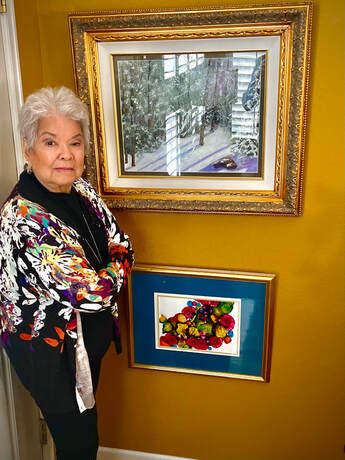 ARDC member Patricia Montano, with two of her original compositions. ARDC member Patricia Montano, with two of her original compositions. After reading this article, we were inspired to reach out to the Aging Resources community in search of similar stories and wisdom, and were delighted to discover that our very own member Patricia Montano, a painter, had much to share. We spoke to her recently about her life in art Aging Resources (AR): When did you start painting? Patricia Montano (PM): Very young – probably sixth grade. I was one of three that were known as the artists of the school. AR: How has your painting evolved over time? PM: Well, I gave it up after I got out of school. I married at 19 and had children soon after. I couldn’t afford to paint. Then, years later, I decided to go to Opportunity School and take a class. They gave us a list of supplies and books we would need for the course, and I was concerned about the expense, but I thought, if I don’t start now I won’t paint again. So, I got the supplies I needed and started painting. Little by little I explored different techniques and different mediums, and met a great teacher who gave me private lessons. From there, I kept looking for classes I could go to and that I could afford. I’ve probably had 35 different teachers. I’ve learned something from all of them. Now, I myself give private lessons. I started with my grandchildren and their friends, and then their friends’ parents and their friends. I’ve just always painted. You can always learn when it comes to painting. Every day is a lesson in art – you always see something beautiful that you can paint or that sparks your imagination. AR: Are there any memorable experiences your art has opened to you? PM: I’ve had four one-person shows, and those were exciting. Now, I’ve got two paintings at St Andrews Methodist Church, and then I’ve got about eight or nine paintings in shops out west of where I live. The one-person shows have really helped me, and I’ve become remembered by some of the classes and shows that I’ve given. AR: Maybe this is too general a question, but - why do you paint? PM: I think that it’s an exciting outlet. I feel like I can create and share beauty through my painting. I’ve been very fortunate – every time I paint, I create something that’s very personal to me. AR: How did you get your start with Aging Resources?
PM: I went to a luncheon and it was funny because I was sitting at table with six or eight people and my niece was showing my artwork to the folks at the table, and one of the gentlemen asked if I would paint at a fundraiser for Aging Resources. I had never done that before, but I said I would and the painting sold well. I’ve been involved with the organization since then. AR: Are there any other thoughts about Aging Resources you’d like to share? PM: You know, they’re very good. When things were bad for me and I couldn’t get up, they brought me groceries. I can always call them for help - they’re just a good shoulder to fall back on. I think they’re a great organization. Thanks so much to Patricia for sharing her story with us, and thanks to you for reading. Do you have a childhood passion to which you’ve returned? What has that experience been like for you? Share your answers in the comments below! |
AuthorsBlogs are written by ARDC staff members Archives
January 2024
Categories |
Aging Resources of Douglas County 104 Fourth Street, Castle Rock, CO 80104 303-814-4300 [email protected]
©2023 Aging Resources of Douglas County | Help for Senior Citizens | Sitemap XML
All public documents will be available upon request.
©2023 Aging Resources of Douglas County | Help for Senior Citizens | Sitemap XML
All public documents will be available upon request.



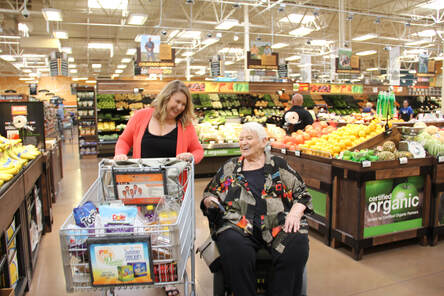


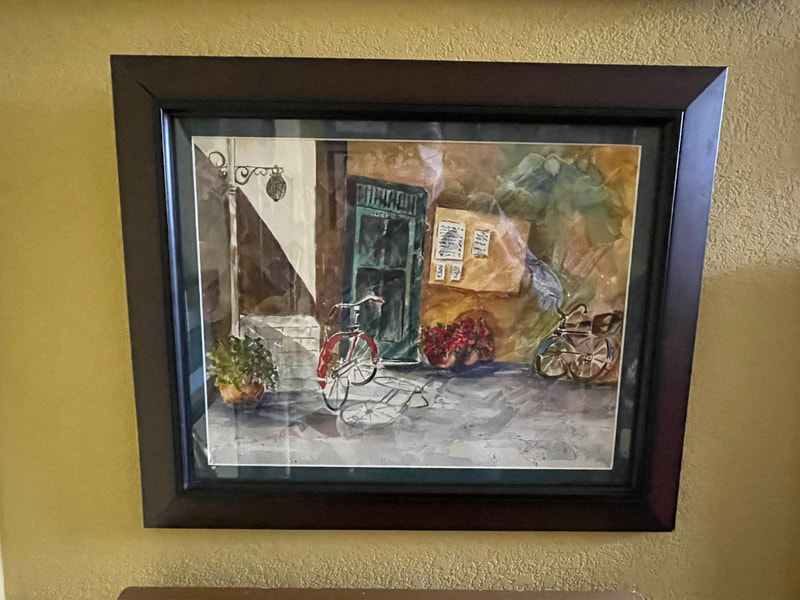


 RSS Feed
RSS Feed

